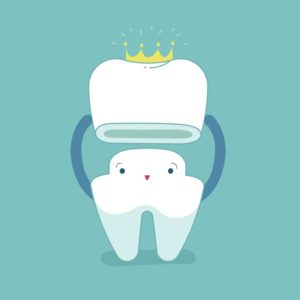
If your dentist has recently let you know that you’re going to need a dental crown, you might have a few questions—and the first one to come to mind is probably “Is it going to hurt?” But dental crowns are a common restorative treatment option that many patients receive, and despite what you’ve maybe heard, getting them is a relatively painless and straightforward process. Keep reading to learn more about dental crowns, including their many uses and what your dentist will do to ensure your comfort while you receive yours.
The Many Uses of Dental Crowns
Dental crowns are basically protective caps for your teeth; they cover them above the gumline and act as special coats of armor, safely sealing your teeth inside and protecting their precious enamel from the many things that threaten it. They have many different uses, including:
- Protecting damaged, fractured, or decayed teeth.
- Covering a misshapen or discolored tooth.
- Preserving a tooth that’s undergone root canal therapy.
- Securing a dental bridge.
- Protecting a dental implant.
Does It Hurt to Get a Dental Crown?
The dental crown procedure typically takes place over the course of two appointments; but despite this, the entire process is relatively pain-free for patients! While you might experience some mild sensitivity, your dentist will give you an anesthetic like they would with a filling. They can even apply a jelly that numbs the skin around the anesthetic injection site—your comfort is your dentist’s top priority, after all!
There’s a chance that you might experience minor pain and tenderness in the affected area after receiving your crown, but this is your body’s natural response to the procedure, and you should be back to feeling normal within a week or so. This soreness can also stem from the anesthetic injection site, rather than the actual crown; but over-the-counter pain medication can usually address this. You might also develop painful problems from failing to properly care for your crown after receiving it. Oral bacteria can easily grow inside the crown and also around it, so be sure to brush and floss daily.
Dental crowns are an excellent option for treating and protecting compromised teeth; and getting them is relatively pain-free! In fact, they actually end up offsetting several potentially painful oral health issues that could develop down the road. That said, if your dentist has informed you that you’ll need a crown, don’t worry—your smile will soon be back on track!
About the Author
Dr. Francisca A. Sanchez has been changing the smiles and lives of patients for over 20 years. Dr. Sanchez received her dental doctorate from the Columbia School of Dental Medicine and is a member of several professional organizations including the American Dental Association and the Academy of General Dentistry. Her practice is proud to offer a wide range of available services including restorative options like dental crowns. If you have any questions about crowns or would like to schedule a visit, you can contact Dr. Sanchez through her practice’s website or by phone: (646) 669-7407.
